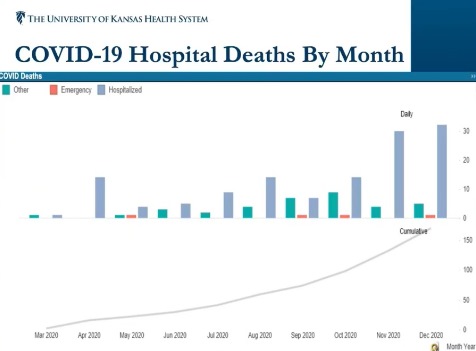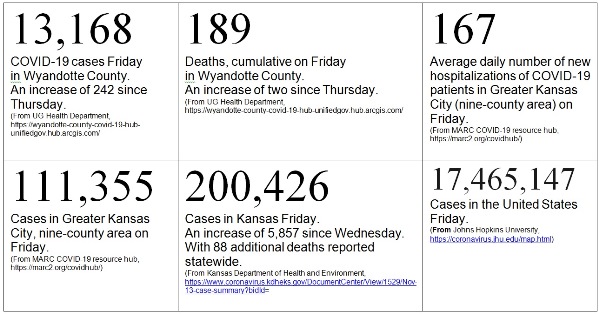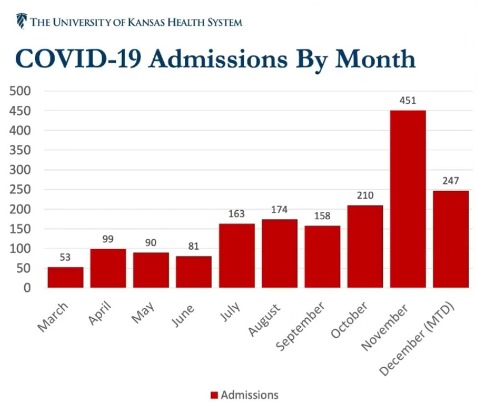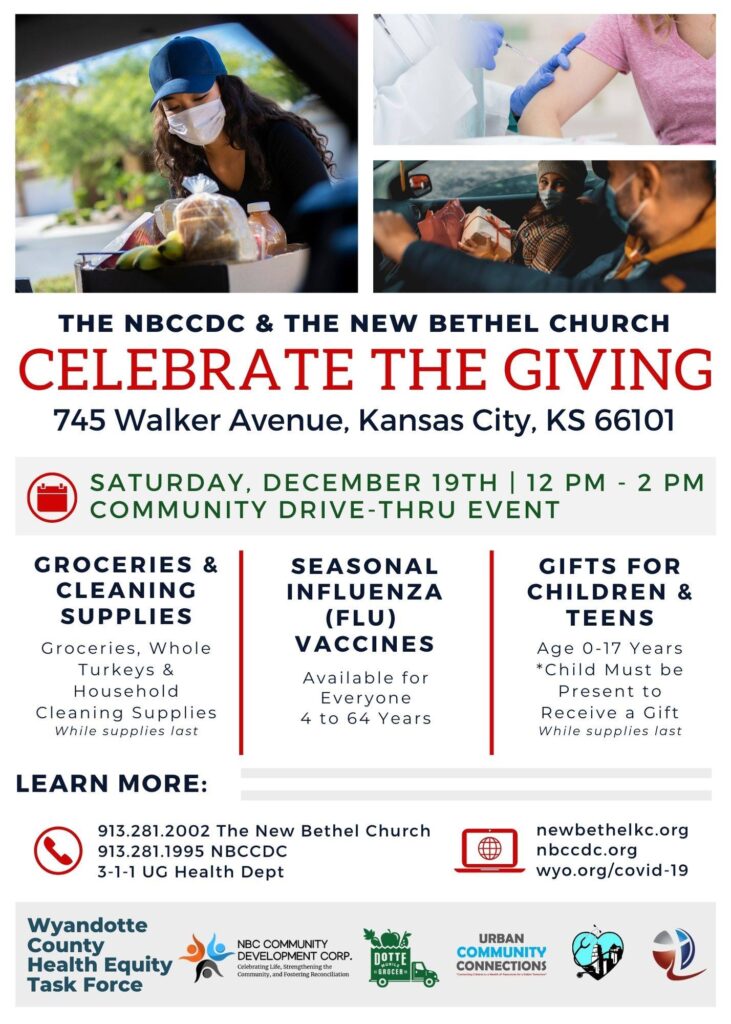

Even though vaccines have started to arrive, COVID-19 is still very deadly here, according to doctors at the University of Kansas Health System in Kansas City, Kansas.
Dr. David Wild, vice president of performance improvement at the KU Health System, said on Friday morning that COVID-19 deaths are at the highest point of the pandemic now.

Hospital admissions also have jumped in the past two months. In October, there were 210 COVID-19 admissions at the hospital, compared to 451 in November. So far in December, there have been 247 hospital admissions, and it was only halfway through the month. He said he expects the December number of deaths to be higher than November’s.
Dr. Wild said he fully expects KU Health System admissions in December to be 500 or higher, a record month, based on the signs he sees in the community.
“Things definitely are not better,” Dr. Wild said.
No doubt there is an effect from all the things the community is doing, such as health orders and individual actions, he said.
“There is good news, but we’re not over the hump,” Dr. Wild said.
KU Health System has been at near capacity for two months now, Dr. Wild said.
KU Health System and other hospitals have seen an influx of COVID-19 patients transferred in from other communities where they have run out of intensive care unit beds. Dr. Wild said those patients who don’t survive are more likely to be in the ICU. Those are the more severe cases. Some of the transfers need ventilators, and the mortality rate is for those on ventilators is higher.
However, there has not been a significant increase in mortality rates, Dr. Wild said. The reason they’re seeing more deaths is because there are more cases, he said.
Asked about delays in the Pfizer shipments scheduled next week, Dr. Wild said there was still a lot that was unknown.
Dr. Wild said they know they need an equal number of doses of Pfizer vaccine three weeks from now. Also, states planned their number of doses they expected to get based on simulation software, and last week the simulation turned off and the ordering process went into place. Some of the decrease may be due to what people thought they could get in a simulation and what is actually available. It does not answer the questions of why there are doses sitting in a warehouse, waiting for orders, however, he said.
What it means for health care workers and patients is the timeline for vaccines might be delayed a little, he said, and that is not promising news.
Dr. Dana Hawkinson, medical director of infection prevention and control, said KU Health System did receive the amount it was supposed to in its initial shipment from Pfizer. While they want as many vaccines as they can get, there can be things that happen that delay them, he said.
Amanda Gartner, director of quality and safety at KU Health System, said not having as much vaccine coming in next week as originally planned would not change anything for them because they have to maintain the good hygiene, social distancing, wearing a mask and not coming in when sick because they will have to do that until the vast amount of the community gets their vaccine.
Moderna vaccine receives emergency use authorization from FDA
The Moderna COVID-19 vaccine received emergency use authorization from the FDA on Friday night, according to an announcement on the FDA website.
It is the second vaccine to receive EUA to fight against COVID-19. The first was Pfizer, which was shipped to Kansas on Monday.
The Moderna vaccine is for use by adults 18 and older, according to the FDA.
“With the availability of two vaccines now for the prevention of COVID-19, the FDA has taken another crucial step in the fight against this global pandemic that is causing vast numbers of hospitalizations and deaths in the United States each day,” Dr. Stephen M. Hahn, FDA commissioner, said in a news release. “Through the FDA’s open and transparent scientific review process, two COVID-19 vaccines have been authorized in an expedited timeframe while adhering to the rigorous standards for safety, effectiveness, and manufacturing quality needed to support emergency use authorization that the American people have come to expect from the FDA. These standards and our review process, which are the same we have used in reviewing the first COVID-19 vaccine and intend to use for any other COVID-19 vaccines, included input from independent scientific and public health experts as well as a thorough analysis of the data by the agency’s career staff.”
The FDA has determined that the Moderna COVID-19 Vaccine has met the statutory criteria for issuance of an EUA, a spokesman stated. The totality of the available data provides clear evidence that the Moderna COVID-19 Vaccine may be effective in preventing COVID-19. The data also show that the known and potential benefits outweigh the known and potential risks—supporting the company’s request for the vaccine’s use in people 18 years of age and older. In making this determination, the FDA can assure the public and medical community that it has conducted a thorough evaluation of the available safety, effectiveness, and manufacturing quality information.
The Moderna COVID-19 vaccine is administered as two doses, one month apart. A study with 30,351 participants was conducted to evaluate the vaccine’s safety amd effectoveness.
According to a spokesman, the most common side effects were pain at the injection site, tiredness, headache, muscle pain, chills, joint pain, swollen lymph nodes in the same arm as the injection, nausea and vomiting, and fever. More people experienced the side effects after the second dose than the first dose, although there could be side effects with either dose.
Kansas scheduled to receive 49,000 doses of Moderna vaccine next week
While the federal government has reduced Kansas’ allotment of the Pfizer COVID-19 vaccine for next week, Gov. Laura Kelly did not seem too worried about it at the Friday morning conference call with local government officials.
Another COVID-19 vaccine, the Moderna vaccine, is scheduled to arrive with 49,000 doses next week in Kansas.
Gov. Kelly said she was told that the reason for the Pfizer vaccine delay might be to smooth out the quantity of deliveries. If they had delivered as many as proposed, they would not have had enough for people to get their second dose when the time comes, she said. It is more of a smoothing process rather than denying Kansas the vaccine, she added.
On Monday, Kansas received more than 23,000 doses of the Pfizer vaccine, which is stored at ultra cold temperatures, she said. The vaccines went to five storage sites, and from there is being distributed to front-line health care workers.
Kansas is one of the states with the broadest, widest distributions, she said. Some states are concentrating vaccine distribution just to highly populated cities. Ninety-five percent of Kansas counties have now received the vaccine and are vaccinating front-line workers, she said. Those that did not receive the vaccine did not request it, she added, for various reasons such as not being prepared to vaccinate people yet.
The state released its timeline on Wednesday for when the vaccine would be given to different groups in Kansas, and Gov. Kelly reiterated that the timeline is dependent on when and how much vaccine the state receives. It’s now extended to the summer of 2021, she added.
The vaccine this winter is primarily for health care personnel, long-term care facility staff and public health workers, and also emergency medical workers, she said.
Later this winter into spring, it will become available on a limited basis for first responders, teachers, child care workers and individuals at high risk for health care consequences, she said.
Then it will become available for all other adults in the spring of 2021, and into the summer, depending on the arrival of the vaccines.
After that all Kansans, including children, will be able to receive the vaccine in the summer, the governor said. The vaccines currently are not approved for children, but trials will be ongoing, and they might be approved next year.
The framework is in line with CDC guidelines and prioritizes those on the front lines of health care. It should foster economic recovery and get kids back in school buildings as quickly as possible, she said.
Gov. Kelly said Kansas has made great strides in increasing its COVID-19 testing. Kansas moved to fourth in the nation for increasing its testing, she said. The state is approaching the million test mark for the pandemic, she said.
There are 39 testing sites available on the GoGetTested.com website, she said. She said people should take advantage of the free testing being offered now. By catching asymptomatic people who have COVID-19, they will stop the spread of the virus, she added.
One of the test sites on this list is at Pierson Community Center parking lot, 1800 S. 55th St., Kansas City, Kansas, which will be open from 9 a.m. to 4:30 p.m. Monday through Saturday. It is through WellHealth. The specimen is collected by spitting into a vial. Those interested in being tested should make an appointment at www.gogettested.com/kansas. They will receive a scheduled time and a notification if open hours are affected by the weather.
With the vaccine, they can enter the new year with confidence that life will return to normal in a number of months, she said.
“We’re not there yet,” she said. Cases and deaths are continuing to rise across the state, she added. Until the vaccine is available to all, Kansans must continue to wear face coverings, socially distance and avoid gatherings and get tested, she said.
Gov. Kelly said the state finance council has extended the emergency order into January, and when the Legislature reconvenes, it can act to extend it again.
Also at the conference call, Maj. Gen. David Weishaar of the Kansas Division of Emergency Management reported that the Kansas National Gurd is continuing to draw down its force involved in fighting COVID-19, and is now down to about 40.
The Kansas National Guard had been assisting with COVID-19 testing, but contractors are now doing testing, he said.
Case numbers jump in Wyandotte County
Wyandotte County reported 13,168 COVID-19 cases on Friday, an increase of 242 cases since Thursday, according to the Unified Government COVID-19 webpage. There were two additional COVID-19 deaths, for a cumulative 189.
The University of Kansas Health System reported 78 COVID-19 active COVID-19 patients in the hospital, down from 82 on Thursday, according to Dr. Hawkinson. There were 35 patients in the intensive care unit, a decrease of two, and 26 patients on ventilators, an increase of two. There were an additional 71 COVID-19 patients hospitalized who are in the recovery stage, a decrease of four from Thursday. A total of 149 COVID-19 patients were hospitalized at KU Health System, a decrease of eight. Two patients died since Thursday’s report.
HaysMed in Hays, Kansas, reported 25 COVID-19 inpatients, a decrease of two since Thursday, with 21 active patients and four in the recovery stage. Two patients have died at HaysMed since Thursday.
Kansas reported an additional 5,857 COVID-19 cases statewide from Wednesday to Friday, according to Dr. Lee Norman, Kansas secretary of health. The total cumulative number of cases was 200,426 in the state. There was an increase of 88 deaths from Wednesday to Friday statewide, according to the Kansas Department of Health and Environment, for a total of 2,341.
The Mid-America Regional Council’s Kansas City Region COVID-19 Data Hub reported an increase of 1,558 COVID-19 cases on Friday, for a cumulative 111,355 in the nine-county area. The average daily COVID-19 hospitalization rate was 167, down slightly. Deaths were up slightly.
Johns Hopkins University COVID-19 dashboard reported 17,465,147 cases in the United States, with 313,660 deaths.
Testing available on Saturday
Scheduled to be open on Saturday is a COVID-19 test site at Pierson Community Center parking lot, 1800 S. 55th St., Kansas City, Kansas, from 9 a.m. to 4:30 p.m. Monday through Saturday. It is through WellHealth. The specimen is collected by spitting into a vial. Those interested in being tested should make an appointment at www.gogettested.com/kansas. They will receive a scheduled time and a notification if open hours are affected by the weather.
Flu vaccines, groceries, gifts available on Saturday

New Bethel Church and the NBCCDC will hold a Celebrate the Giving event from noon to 2 p.m. Saturday, Dec. 19, at 745 Walker Ave., Kansas City, Kansas.
This drive-through event will include free seasonal flu vaccines for everyone from 4 to 64 years old, as well as groceries and cleaning supplies while supplies last, and gifts for children and teens ages 0 to 17, while supplies last. Children must be present to receive a gift.
This event is sponsored by the Wyandotte County Health Equity Task Force, NBC Community Development Corp., Dotte Mobile Grocers, Urban Community Connections and New Bethel Church.
Additional testing sites are at https://wyandotte-county-covid-19-hub-unifiedgov.hub.arcgis.com/pages/what-to-do-if-you-think-you-have-covid-19.
The KU doctors’ news conference is online at https://www.facebook.com/kuhospital/videos/769517423641788.
For more information about the testing site at the former Kmart location, visit https://alpha.wycokck.org/files/assets/public/health/documents/covid/10092020_newtestingsitewyco.pdf.
To see information about the UG giving vaccines to health care workers next week, visit https://wyandotteonline.com/ug-to-start-giving-covid-19-vaccines-to-health-department-and-ems-personnel-next-week/.
The KDHE vaccine report is at https://www.coronavirus.kdheks.gov/DocumentCenter/View/1664/COVID-19-Vaccine-Updates-1292020-.
Cards and letters of encouragement for caregivers at KU Health System may be sent to Share Joy, care of Patient Relations, 4000 Cambridge St., Mailstop 1021, Kansas City, Kansas, 66160. Emails can be sent to [email protected].
Wyandotte County is under a mandatory mask and social distancing order. Also, the Wyandotte County health order with a limit of 10 persons to a gathering, and a closing time of 10 p.m. for restaurants and bars, with other new restrictions, is at https://alpha.wycokck.org/files/assets/public/health/documents/covid/11162020localhealthorderexecuted.pdf.
The UG COVID-19 webpage is at https://alpha.wycokck.org/Coronavirus-COVID-19-Information.
The KDHE’s COVID-19 webpage is at https://www.coronavirus.kdheks.gov/.
The KC Region COVID-19 Hub dashboard is at https://marc2.org/covidhub/.
The Wyandotte County page on the Johns Hopkins COVID-19 website is at https://bao.arcgis.com/covid-19/jhu/county/20209.html.
The CDC’s COVID-19 webpage is at https://www.cdc.gov/coronavirus/2019-nCoV/index.html.
